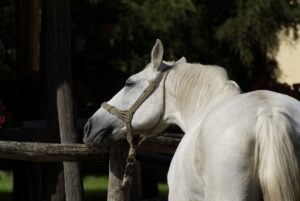 This is Pt. 5 of Parasites and the Equine Gut, a new series investigating the connection between parasite control and your horse’s digestive health — and what we can do to help.
This is Pt. 5 of Parasites and the Equine Gut, a new series investigating the connection between parasite control and your horse’s digestive health — and what we can do to help.
In the first few posts in this series, investigating the
relationship between parasites and equine gi tract health, we focused on some specific ways in which worms can negatively impact your horse’s health.
Ulcers,
anemia, inflammation and other types of internal damage are all common effects of parasitic infections. In
Pt. 5: Parasites and Colic in Horses, we’ll talk about how and why parasites can cause colic, plus dispel a myth or two about the relationship between colic and dewormers.
Colic and Parasites in Horses
The vast majority of colics are idiopathic, or “of unknown cause,” and may be
induced by generally poor gi tract health or management mistakes. However, parasites are one cause of colic that may be easiest to identify definitively. Parasite-related colic can be caused by:
- Strongyle larvae. When the larvae migrate around the intestine and throughout the organs, they damage blood vessels in the intestines, decreasing blood supply and in turn, causing tissue death, decreased motility and pain.
- Roundworms. When a horse has a heavy infestation of roundworms, they can cause impaction or obstruction of the intestines, which can cause impaction colic.
- Deworming medication. Horses that are very heavily infected with parasites may experience a bout of colic after you deworm them with paste wormer. It’s important to know that paste dewormer does not cause colic — but allowing parasites to build up in your horse’s system could cause an impaction of dead worms leaving the system. Best practice is to keep your horse on a regular deworming schedule.
- Any damage created by parasites during their life cycle. Anything that negatively impacts the horse’s digestive system can cause a problem that may lead to colic.
You may be working with a new horse that came to you with a heavy parasite load. Infections are growing more common in horses again as parasites grow resistant to the popular anthelminthic treatments. Colic may be induced by parasite load, and it is deadly. Working with your veterinarian to develop a targeted management plan is critical for reducing parasites and preventing colic.
Parasites Increase the Risk of All Digestive Problems in Horses—Especially Colic
The past few posts in this series have discussed parasites and their relationship with
colonic and gastric ulcers,
anemia, and finally, colic. The bad news is that all three of the previously discussed digestive issues can result in colic. That’s because anything that compromises your horse’s digestive system, whether it’s ulcers, hindgut inflammation, acidosis, or any other type of digestive damage, results in decreased digestive function and possibly colic.
The good news is that we can do something to control all of the factors that lead to these types of symptoms. And all of them start with controlling parasites.
Up Next: Better Parasite Control for Horses
We’ve been talking a lot about the problems parasites cause for your horse’s digestive health—in the sixth and final installment of this series on the equine gut, we’ll be talking about how to identify, treat and prevent parasites in your horse. Be sure to
subscribe to the SUCCEED blog so you don’t miss this important final post in this series,
Pt. 6: Better Parasite Control for Horses.
 This is Pt. 5 of Parasites and the Equine Gut, a new series investigating the connection between parasite control and your horse’s digestive health — and what we can do to help.
In the first few posts in this series, investigating the relationship between parasites and equine gi tract health, we focused on some specific ways in which worms can negatively impact your horse’s health. Ulcers, anemia, inflammation and other types of internal damage are all common effects of parasitic infections. In Pt. 5: Parasites and Colic in Horses, we’ll talk about how and why parasites can cause colic, plus dispel a myth or two about the relationship between colic and dewormers.
This is Pt. 5 of Parasites and the Equine Gut, a new series investigating the connection between parasite control and your horse’s digestive health — and what we can do to help.
In the first few posts in this series, investigating the relationship between parasites and equine gi tract health, we focused on some specific ways in which worms can negatively impact your horse’s health. Ulcers, anemia, inflammation and other types of internal damage are all common effects of parasitic infections. In Pt. 5: Parasites and Colic in Horses, we’ll talk about how and why parasites can cause colic, plus dispel a myth or two about the relationship between colic and dewormers.



